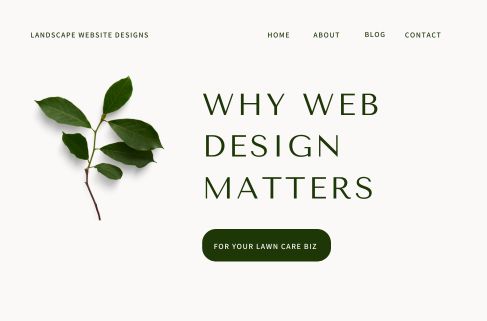Why Web Design Matters For Your Lawn Care Biz

Table of Contents
Imagine visiting a website with a confusing layout, tiny fonts that are hard to read, and glaring colors that strain your eyes. Now, picture a website that’s clean, easy to navigate, and visually appealing.
The experience of using each website is likely very different. This illustrates why web design significantly shapes our online interactions.
What Is the Psychology Behind a Properly Designed Website?
Anyone who has navigated a well-organized website understands the immediate sense of relief and comfort it provides. From the moment the page loads, an intuitive and appealing design guides you where to go. This reveals a profound psychological aspect of why web design matters in our daily digital interactions.
Creating the First Impression
The moment a website appears on your screen, it sets the tone. If it looks modern and professionally designed, it communicates trust and reliability. A well-designed website can make you feel confident and confident about the quality of the service or product.
The psychology here is straightforward–we prefer orderly and inviting environments. A well-designed website suggests that a company is legitimate and cares about its customers. This is the first compelling example of why web design matters; it essentially functions as the digital storefront of a business.
Enhancing User Experience Through Design
A properly designed website does more than just look good. It makes the experience of using the site smoother and more enjoyable. This involves having a clear navigation path, fast loading times, and seamless interactive elements.
For example, a ‘call to action’ button might be designed to stand out and encourage you to click.This user-friendly environment reduces frustration and makes the information or services accessible to everyone. Accessibility is key in design, considering people with different abilities need to be able to use the web equally.
The underpinning psychology explains why web design matters, as users are more likely to return to a website that they found enjoyable and easy to use.
Building Consistency and Brand Identity
Consistency in web design helps to reinforce your brand identity. A website consistently uses the same colors, fonts, and layout styles, reinforcing brand recognition. Users will become familiar with your brand and more likely to trust it over time because of the consistency they observe.
This repeated exposure to specific design elements associated with your brand can generate a sense of reliability. Consistency simplifies navigation, as familiar cues help users navigate your site more efficiently. Again, this is another example of why web design matters—it’s not just about aesthetic appeal but about creating a reliable user environment.
Influencing Decisions Through Emotional Connectivity
Your website’s choice of colors, images, and text doesn’t just fill space. These elements can evoke emotions and influence decision-making. For example, blue can evoke feelings of trust and security, often seen on bank websites, while green might promote a sense of calm, commonly used in health and wellness sites.
This use of psychological triggers highlights why web design matters. A well-thought-out design can help align user emotions with the website’s goals, whether feeling energized to join a gym or confident to bank online.
Driving Conversion with Strategic Design
Ultimately, one of the biggest reasons web design matters is how it impacts conversions. Whether a site’s goal is to sell products, gain subscribers, or collect information, the website’s design plays a crucial role. Strategic placement of calls to action, persuasive ‘Buy Now’ buttons, and easy-to-find contact information all contribute to this goal.
Web design is deeply entwined with marketing psychology. The layout, navigational pathways, and even the micro-interactions on a site can guide a user subtly toward making a purchase or signing up for a newsletter. Knowing how to craft these elements to create an engaging user experience is why web design matters in achieving business objectives.
Why Is Website Design Important?
When people visit your website, their first impression comes from its design. Research shows that web design is crucial because it affects how visitors perceive your business, how they interact with your content, and whether they trust your brand.
Here are other reasons why website design is important:
First Impressions Count
Your website is often the first interaction potential customers have with your business. A well-designed site instantly creates a positive impression, while a poorly designed one can turn visitors away within seconds. When your website looks professional and visually appealing, visitors know you care about your business and, by extension, your customers.
This is a key reason why web design matters.
User Experience and Navigation
A good web design ensures that users can easily find what they want. Clear navigation, intuitive layout, and fast-loading pages contribute to a positive user experience. When visitors can effortlessly navigate your site, they are likelier to stay longer, explore more, and ultimately convert into customers. This smooth experience is a testament to why web design matters.
Building Trust with Your Audience
Trust is a crucial element in any business relationship. A well-designed website can build trust by providing a professional look and feel, ensuring security, and offering clear and transparent information.
Features like HTTPS, precise contact details, and customer testimonials make visitors feel safe and secure.
This level of trust is why web design matters for your business’s credibility.
Mobile Responsiveness
More people are accessing websites on their mobile devices than ever before. A mobile-responsive design ensures your site looks and functions well on all screen sizes. If your website isn’t mobile-friendly, you risk losing a significant portion of potential customers.
Ensuring your site is accessible and easy to use on mobile devices clearly indicates why web design matters in today’s digital age.
SEO and Visibility
Search engine optimization (SEO) is vital for getting your website noticed by search engines like Google. A well-designed website is easier for search engines to crawl and index.
Proper use of headers, images, and meta tags all contribute to better SEO performance.
This improved visibility is another reason why web design matters, as it directly impacts your site’s traffic and ranking.
Brand Identity and Consistency
Your website is a reflection of your brand. Consistent use of colors, fonts, and imagery helps to build a cohesive brand identity. This consistency reinforces your brand message and makes your business more recognizable.
A strong, consistent brand presence is why web design matters when establishing and maintaining your brand identity.
Conversion Rates
The ultimate goal of any website is to convert visitors into customers. Effective web design can significantly boost your conversion rates. Clear calls-to-action (CTAs), user-friendly forms, and persuasive design elements guide visitors toward the desired actions.
This direct impact on your bottom line shows why web design matters for your business’s success.
Competitive Advantage
In a crowded online marketplace, standing out from the competition is essential. A unique, well-designed website can set you apart from competitors and make a lasting impression on visitors.
Investing in quality web design is a strategic move that highlights why web design matters for gaining a competitive edge.
Accessibility
Web accessibility ensures that all users, including those with disabilities, can use your website effectively. Features like alt text for images, proper contrast ratios, and keyboard navigation make your site accessible to everyone. Prioritizing accessibility is ethical and broadens your audience reach, underscoring why web design matters.
Keeping Visitors Engaged
An engaging website keeps visitors interested and encourages them to explore more pages. Interactive elements, engaging content, and visually appealing design create a more enjoyable browsing experience. This engagement is crucial for reducing bounce rates and increasing visitors’ time on your site, highlighting why web design matters for maintaining audience interest.
Reflecting Your Professionalism
Your website is an extension of your business. A professional web design conveys that you are serious about what you do and invest in quality. This professionalism attracts more serious and committed customers, proving why web design matters.
Adaptability to Changes
A flexible web design allows you to make updates and changes as needed easily. Whether it’s adding new content, updating services, or rebranding a well-designed website makes these adjustments straightforward. This adaptability ensures your site remains relevant and up-to-date, showcasing why web design matters for long-term success.
Customer Support and Satisfaction
A well-designed website includes easy-to-find contact information, FAQs, and support options. Providing these resources helps to answer customer queries quickly and efficiently, leading to higher satisfaction levels. This attention to customer needs is a key reason why web design matters for building strong customer relationships.
Cost-Effectiveness
Good web design may seem expensive initially, but it pays off in the long run. A well-designed website requires fewer updates, has fewer technical issues, and attracts more visitors. This cost-effectiveness is a practical reason why web design matters for businesses of all sizes.
Final Thoughts
It’s evident that web design holds significant importance in the success of any online venture. From making a solid first impression to enhancing SEO and standing out from the competition, good web design is at the heart of a successful online presence. As the digital landscape continues to evolve, the reasons why web design matters only become more compelling.
Investing time, resources, and thought into creating a well-designed website can pay off in more ways than one, ultimately leading to a stronger connection with your audience and better overall performance of your online platform.
Remember, your website is often the first point of contact with potential customers, so make it count.
At Landscape Website Designs, we specialize in creating cutting-edge, professional websites specifically tailored for landscape professionals. Don’t let the competition outshine you; visit us at Landscape Website Design to explore our comprehensive services, from full website development to custom logo design.
Get started today and watch your business grow! Need more information?
Schedule a call with us now, and let’s discuss how we can bring your vision to life.
Do You Need Other Help?
We’re not just landscaping web design experts we also offer business logo design and copywriting for businesses.
You can also check out our other landscaping web design services and pricing.
Start-up essentials for a landscape and gardening business:
- 17 Creative Lawn Mowing Business Names
- Tips To Grow Your Landscaping Business During Slow Months
- How To Start a Landscaping Business
- How to start a Lawn Care Business: What You Need to Know
- How to Start a Successful Landscaping Business Website
- Landscaping Website During Winter
- Free vs Paid Website Builder for Landscaping Business
- 8 Landscape Design Logo Example for Your Inspiration
- Budget-Friendly Lawn Care Equipment List for Your Business
- What To Do Once You Have a Website for Your Landscaping Business
- SEO For Landscaping Company
- The Top Ten Best Landscaping Company Websites
- Your Quick Guide: Lawn Care Website Design Ideas
- 3 Landscaping Website Design Examples
- The Ultimate Guide for Landscaping Company Logo Ideas
- Key Elements of The Best Lawn Care Websites
- Top 10 Landscaping Companies for your Design Ideas
- Exploring 16 Lawncare Web Design Features For Your Future Reference
- Create a Stunning Landscape Company Website with the Best Website Builder
- How to Make a Lawn Care Website
- Why Web Design Matters For Your Lawn Care Biz
If you need help, check out our offers below:
